Book contents
- Frontmatter
- Dedication
- Contents
- List of Figures
- Acknowledgments
- List of Abbreviations
- Introduction: High Tides, Atlantic Waters
- 1 The Pilots of Pill
- 2 The Hazards of the Bristol Slave Trade
- 3 Slave-ship Sociology
- 4 The Unfortunate Shipwright, or, the Trials of Robert Barker
- 5 Mutiny and Murder on Bristol’s Long-haul Ships, 1720–70
- 6 Bristol Privateering in the Mid-eighteenth Century
- 7 The Impressment of James Caton, 1779
- 8 New York in Bristol: the Crugers
- 9 The Politics of Abolition in Late Eighteenth-century Bristol
- Bibliography
- Index
Introduction: High Tides, Atlantic Waters
Published online by Cambridge University Press: 08 May 2024
- Frontmatter
- Dedication
- Contents
- List of Figures
- Acknowledgments
- List of Abbreviations
- Introduction: High Tides, Atlantic Waters
- 1 The Pilots of Pill
- 2 The Hazards of the Bristol Slave Trade
- 3 Slave-ship Sociology
- 4 The Unfortunate Shipwright, or, the Trials of Robert Barker
- 5 Mutiny and Murder on Bristol’s Long-haul Ships, 1720–70
- 6 Bristol Privateering in the Mid-eighteenth Century
- 7 The Impressment of James Caton, 1779
- 8 New York in Bristol: the Crugers
- 9 The Politics of Abolition in Late Eighteenth-century Bristol
- Bibliography
- Index
Summary
As you leave the archives and walk to the river's edge, you can sometimes see the tide turning. The tidal range of Bristol's River Avon is immense; at its highest point on the highest spring tide, nearly 50 feet. In 1830 it was reckoned to be 40, and in the late eighteenth century, before the construction of the floating dock, around 36. Pilots were needed to ferry ships up the river at full tide; indeed, pilots were needed to guide vessels from the stormy Bristol Channel towards Kingroad, the estuary of the Avon, where the ships would drop anchor and await a favourable wind and tide to take them seven miles to the city's centre.
This set of essays begins with the pilots, a body of men who lived at Crockerne Pill, close to the first natural harbour on the river at Hungroad. This closely-knit community created a dense cousinage to confront the dangers of piloting in the Bristol Channel. Aware of their importance to Bristol's commercial prosperity, the pilots were quite willing to carve some independence from the merchant oligarchy that officially regulated them and the Admiralty who sought to curb their willingness to help sailors escape the press. Pill became a haven for runaway seamen and illicit commerce, a thorn in the side of the city, the merchants, and the national government, who, for sound commercial and environmental reasons, had to tolerate its rambunctious disrespect for constituted authority.
Chapter one presents an indispensable link from the quay to the Atlantic. The other chapters zone in on different aspects of Bristol's broader maritime history. Although Bristol was always something of a metropolis of the west, an important market and distributing centre for goods made or grown in the West Country and Wales, overseas commerce was the lifeblood of the city. That commerce was diverse. Bristol had strong links with Ireland, trading with Dublin and the ports to the south such as Cork, Limerick, Kinsale, and Waterford. At the beginning of the eighteenth century, seventy vessels carried dairy produce, salted beef and pork, linen, leather, and timber to Bristol in return for manufactured goods and colonial products.
- Type
- Chapter
- Information
- Maritime Bristol in the Slave-Trade Era , pp. 1 - 12Publisher: Boydell & BrewerPrint publication year: 2024

